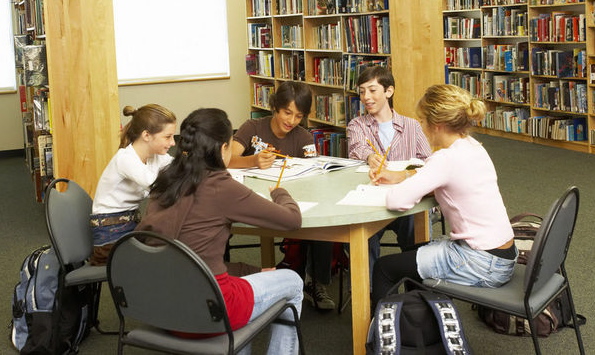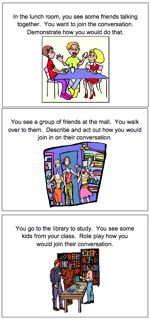


The following article comes to you from abcteach Special Needs creator and veteran, Janie Quinn. In this post, you’ll find tips and tools to help young children develop and establish appropriate interpersonal communication skills.
Social Skills
Social skills are a collection of behaviors and actions that allow us to initiate and maintain appropriate interactions with others. The scope of the skills and behaviors necessary to successfully navigate in society may differ depending on where and with whom we are. They also change as we grow and mature. Social skills are complex because they are influenced by the world around us – culture, gender, region, and religion are to name but a few. The rules and regulations governed by these societal norms impact many of our social interactions, and therefore, provide no clear rules that apply in all situations. Modeling, role playing, and teaching problem solving skills to children and young adults will provide a wide repertoire of skills to help them prepare for successful interpersonal interactions.
Social skills need to be taught and practiced across a variety of situations. Acceptable behaviors may differ slightly depending on the setting (library vs. park), and the people (family vs. friends vs. strangers). Children and young adults need exposure to problem solving experiences in a wide range of situations to give them foundations upon which to build and refer to when faced with new experiences. Building social skills training into everyday life is a great way to accomplish this goal. These skills can be presented in a fun, game-like fashion as part of a schedule or routine. They can also be presented spontaneously whenever you have about 10 minutes of “spare time” inclusive of school (the first or last few minutes of a class), home (before or after dinner), or most anywhere!
Social Skills Flashcards
 abcteach has recently introduced a collection of Social Skill Flashcards to the member site. These cards contain a variety of scenarios and points to consider to help incorporate social skills instruction and practice into everyday life. Here is one way to use them: Print, cut out, fold, and tape together the flashcards, then bundle them like a deck of cards. Once a Social Skill Flashcard card is drawn, read the scenario, give a quick, yet simple introduction of the skill concept, then review the points to consider. Next, discuss and debate appropriate solutions and formulate an idea and plan. Assign different roles – and let the fun begin! If a suggested solution borders on being an appropriate choice, let the person suggesting the solution role play their idea. Once role played, discuss the pros and cons of the solution. Ask, “Was that the best possible solution for this situation? What can you do differently to improve the outcome of the situation?” Perform the teaching process again using the new and improved solution. Discuss why it is or is not a better solution. These strategies also apply if there is more than one appropriate solution to the scenario.
abcteach has recently introduced a collection of Social Skill Flashcards to the member site. These cards contain a variety of scenarios and points to consider to help incorporate social skills instruction and practice into everyday life. Here is one way to use them: Print, cut out, fold, and tape together the flashcards, then bundle them like a deck of cards. Once a Social Skill Flashcard card is drawn, read the scenario, give a quick, yet simple introduction of the skill concept, then review the points to consider. Next, discuss and debate appropriate solutions and formulate an idea and plan. Assign different roles – and let the fun begin! If a suggested solution borders on being an appropriate choice, let the person suggesting the solution role play their idea. Once role played, discuss the pros and cons of the solution. Ask, “Was that the best possible solution for this situation? What can you do differently to improve the outcome of the situation?” Perform the teaching process again using the new and improved solution. Discuss why it is or is not a better solution. These strategies also apply if there is more than one appropriate solution to the scenario.
When teaching social skills, practicing in a variety of settings is extremely important. Practice in both public (school, church, the park, the library, the mall) and private (your home, a relative’s home. a friend’s home) settings. Also, consider practicing the skills in formal (with a person of authority, a fancy party, a job interview) and informal (at home, with grandparents, at a friend’s casual party) situations. Each of these scenarios has its own set of appropriate behaviors. Discussion, practice, and experience will help ease the confusion and anxiety that often come with new places and environments.
Another important component to social skills is interaction with a variety of people. Our sense of familiarity with family and close friends differs greatly from appropriate behaviors with strangers and people in authority positions. We are expected to act differently with a relative than with our school principal. Acting overly familiar during a job interview can be the difference in gaining or losing a desired job. Learning how to interact in a formal fashion (community helpers, boss or supervisor, principal, strangers) vs. an informal fashion (close family, close friends) can determine the success of our social lives and the ability to live independently in our community.
The more practice and exposure children and young adults receive, the more confident and comfortable they will become with social interactions and activities. To promote skill generalization and maintenance, encourage these individuals to continually use their new skills in a variety of places and with a range of people. Learning the skills to initiate and maintain positive social relationships will lead to acceptance, adjustment, and independence. Making the learning of these skills fun and functional will help our children and young adults acquire and generalize the appropriate social skills for independent living.
Over the next few months, abcteach will be adding additional flashcards to the collection. If there are specific skills you would like to see addressed, please let us know!
Posted by Janie Quinn, abcteach Team

